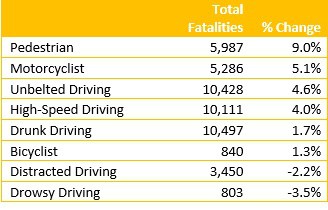 The U.S. Department of Transportation’s National Highway Traffic Safety Administration (NHTSA) recently released a report on 2016 traffic deaths. Fatalities rose significantly from 2015, with an especially marked increase in high-speed traffic deaths, a trend that is mirrored in Illinois.
The U.S. Department of Transportation’s National Highway Traffic Safety Administration (NHTSA) recently released a report on 2016 traffic deaths. Fatalities rose significantly from 2015, with an especially marked increase in high-speed traffic deaths, a trend that is mirrored in Illinois.
Report Shows Increase in Fatalities
According to the NHTSA’s report, released on October 6, 2017, overall traffic deaths in 2016 were up 5.6% percent from the 2015 numbers, for a national total of 37,461 lives lost. Illinois, however, had an even higher percentage increase in deaths from 2015 to 2016, at 8.4% for a total of 1,082 deaths.
While distraction-related and drowsy driving fatalities declined, most categories of driving deaths were up from the previous year:

High-speed driving resulted in the third most traffic deaths, at 10,111 with a 4.0% increase from the previous year, behind drunk driving and driving without a seatbelt. High-speed traffic deaths make up nearly 27% of road fatalities nationally, and they are especially significant, as speeding is an easily avoidable action that places a vehicle’s driver, and others, in potentially grave danger.
Dangers of High-Speed Driving
Speeding is defined as either driving in excess of the posted speed limit or driving at an unsafe speed for road conditions, such as with heavy rain, snow, ice, or other road surface anomalies. While motorists chiefly avoid speeding because of a fear of citations, fines, traffic school, higher insurance premiums, and loss of their driver’s licenses, a more important reason to drive at the appropriate speed is this: High-speed driving kills.
There is a statistical link between high-speed driving and traffic fatalities. In 1996, the Insurance Institute for Highway Safety (IIHS) conducted research after multiple states raised their interstate highway speed limits. The IIHS found that motor vehicle fatalities in states that raised their speed limits increased more than in states that did not. Why is high-speed driving so dangerous?
- Speeding decreases the amount of reaction time that a driver has to avoid a crash.
- Speeding drivers lose their ability to control their vehicles, especially under bad road conditions.
- Crashes involving speeding vehicles are more likely to be severe. In fact, the NHTSA found that, in speeds in excess of 50 m.p.h., the crash impact doubles with every 10 m.p.h. increase.
- Drivers who speed are more likely to engage in additional reckless activities, such as not wearing their seatbelts.
As you can see, speeding can lead to more frequent and more severe crashes, increasing the likelihood of high-speed traffic deaths.
How to Combat High-Speed Traffic Deaths
What can be done to address this public safety issue? Experts suggest some common sense approaches. According to the National Safety Council, an Itasca-based organization that has run defensive driving courses since 1964, drivers should:
- Leave earlier for their destinations, thereby reducing their need to speed.
- Check traffic patterns.
- Pull over to the side of the road when endangered by a speeding vehicle, take down the vehicle’s license plate, and report it to the police.
While high-speed traffic deaths may remain a perpetual problem in American life, if we all exercise caution and pay better attention, we can help make our roads less dangerous.
Speeding Driver Accident Litigation
As must seem all too clear, even with the most modern of safeguards, high-speed traffic deaths and serious injuries are public health hazards. For this reason, those who are injured or whose loved ones have been killed by a speeding driver often find that they could benefit from the guidance of an experienced attorney to help them get the justice that they deserve, like the Chicago speeding accident attorneys at GWC Injury Lawyers, Illinois’ largest Personal Injury and Workers’ Compensation law firm.
If you or your loved one has been injured by a speeding driver, please contact GWC today to schedule a free consultation with one of our attorneys. Call our office at (312) 464-1234 or click here to chat with one of our representatives.
<< BACK TO BLOG POSTS